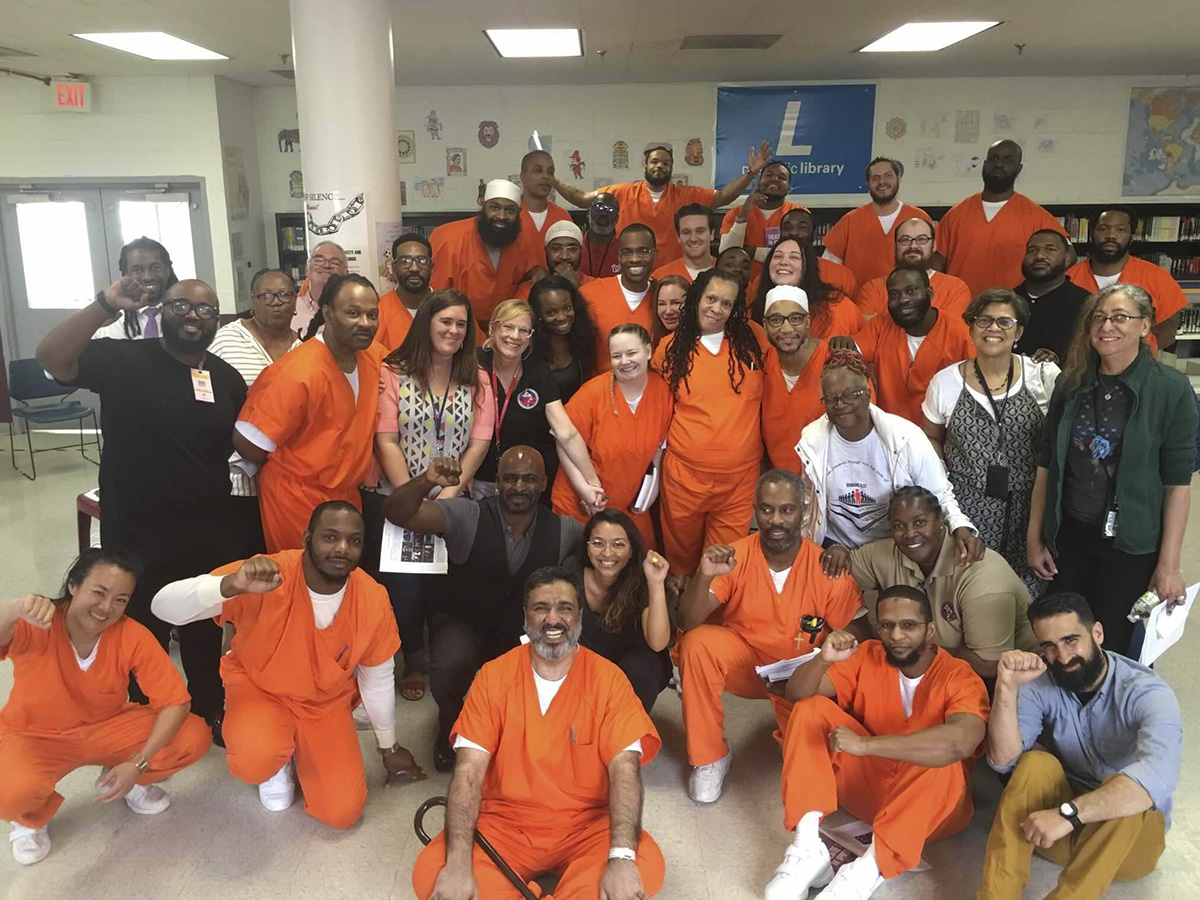UCLA Prison Education Program brings college courses to incarcerated individuals

Program coordinators and participants of the UCLA Prison Education Program come together in a classroom. The UCLA Prison Education Program gives incarcerated individuals access to postsecondary education. (Courtesy of Claudia Peña/Co-director of the UCLA Prison Education Program)
By Shehreen Karim
Jan. 18, 2022 3:17 p.m.
After being incarcerated as a juvenile, Abel Diaz didn’t see college as an option until he took classes through the UCLA Prison Education Program.
“It kind of allowed us to escape from the predicament that we were in at the time. It allowed us to kind of leave that momentary cage that we found ourselves in,” Diaz said.
Currently only two University of California schools, UCLA and UC Irvine, offer prison education programs. The UCLA Prison Education Program provides incarcerated women and young people access to postsecondary education by bringing in UCLA faculty and students to learn alongside them. UCI’s prison education program, UCI LIFTED, is hosting a pilot bachelor’s degree program this upcoming fall.
“Going to those courses that UCLA offered, they kind of made it a reality for me,” Diaz said. “I came from a broke family, you know. School was never a reality for me. But the classes opened my mind to kind of tell myself, ‘Okay, this is a possibility. I can do this.’”
Bryonn Bain, one of the program directors, said they launched the program in 2015 after he talked to incarcerated women who had multiple associates degrees and wanted to further their education.
“They wanted to return home with more education instead of less education, to be able to offer something meaningful to their families,” Bain said. “And so the following week after that focus group, I got letters from 139 women in the prison saying we need UCLA to start a bachelor’s degree program here.”
The program, which takes UCLA students and professors by bus to correctional facilities and juvenile halls, has partnered with multiple correctional facilities such as the California Institution for Women and Barry J. Nidorf Juvenile Hall.
UCLA was the first UC to offer a certificate in justice studies in partnership with UCLA Extension for incarcerated students and is attempting to follow in the footsteps of California State University, Los Angeles to start a bachelor’s degree program, Bain said.
Diaz said he earned a justice studies certificate through the program, and it eventually became a stepping stone for him to pursue a bachelor’s degree after he was released.
Claudia Peña, co-director of the program with Bain, said students who participated in the program and are no longer incarcerated continue to collaborate with the program.
“They continue to want to work side by side with us to collaborate and seem to continue to do really incredible work around reentry,” Peña said.
According to a study by Rand Corporation, people who participated in education programs in prison had a 43% lower chance of being reincarcerated.
“So we see education work as liberation work. We see this as part of a larger movement of mass decarceration,” Bain said.
Armando Tellez, a former associate director, said the program not only offers college courses but also tries to replicate the college experience for incarcerated students.
“Being a college student entails more than just going to lectures and going home, right? Students have the opportunity to go to protests and go to presentations. There’s so much on a college campus that goes on,” Tellez said.
Diaz added that one of the classes he took in the program involved theater and arts in which groups performed scripts they wrote.
“We were able to just freely interact with everybody and just be ourselves,” Diaz said. “(We could) just let our guard down a little bit and interact with everybody in a different way than kind of what we were used to from being inside.”
Alongside UCLA, UCI also hosts its own prison education program.
Keramet Reiter, the director of UCI LIFTED, said UCI is in the process of admitting its first incarcerated student cohort in fall 2022. If all goes as planned, UCI would be the first UC to offer a bachelor’s degree to incarcerated students, she said.
Reiter said all UCs should be a part of the prison education initiative.
“If we think incarcerated students are residents of the state who have equal opportunity access, that’s one reason why it’s important for the UCs to be involved with the community colleges and the Cal States,” Reiter said.
One of the common misconceptions among the public when preparing this program was doubting that incarcerated students would be able to handle the coursework, Reiter said.
“In my experience, having been involved in higher education in prison for a long time, these are some of the most motivated students I have ever worked with. They tend to be people who are adults, they’re older than the average UC student, and they really know what it means to not have had a college education,” Reiter said. “They’re incredibly grateful for these opportunities.”
Both programs hope to get more funding and resources to reach a point where student tuition is covered. With more funding, the program would be able to have more classes for incarcerated studies, Peña said.
“But beyond that, we want every class that we can (to) bring UCLA students into the correctional facility, to really begin to break down misconceptions and those notions of this separation between those who are inside or outside. We want to create those opportunities for folks to learn with and from each other inside the prison,” Bain said.


